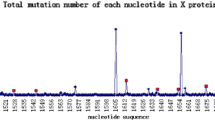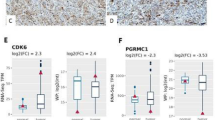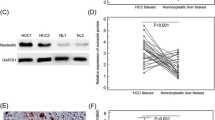Abstract
The significance of p53 mutations in the primary lesion for recurrent hepatocellular carcinoma (HCC) was evaluated. Mutations of p53 were examined using non-radioisotopic (nonRI)-polymerase chain reaction (PCR)-single strand conformation polymorphism (SSCP) in 98 resected HCCs. Of the 98 cases, 25 (26%) had a p53 mutation. In 83 patients who survived surgery, the presence of a p53 mutation was associated with a shortened overall survival (P<0.001) and a shortened cancer-free survival (P<0.05). In 43 patients who developed recurrence, there was no statistically significant correlation between the status of p53 in the primary lesion and the clinical features of recurrent HCCs examined, i.e., extrahepatic metastasis, the number of recurrent tumors, extent of recurrent tumors, and treatment for recurrent tumors. However, postrecurrence survival was significantly lower in patients in whom a p53 mutation had been detected in the primary lesion (P<0.01). A multivariate analysis for prognostic value after recurrence revealed that the p53 mutation was a useful independent prognostic factor affecting survival after recurrence (P<0.01). In conclusion, our findings suggest that HCCs with p53 mutations have a high malignant potential based on their poor prognosis. Therefore, a p53 mutation in the primary lesion is useful as an indicator of the biological behavior of recurrent HCCs.
Similar content being viewed by others
References
Ikeda K, Saitoh S, Tsubota A, Arase Y, Chayama K, Kumada H, Watanabe G, Tsurumaru M (1993) Risk factors for tumor recurrence and prognosis after curative resection of hepatocellular carcinoma. Cancer 71:19–25
Ebara M, Ohto M, Sugiura N, Kita K, Yoshikawa M, Okuda K, Kondo F, Kondo Y (1990) Percutaneous ethanol injection for the treatment of small hepatocellular carcinoma. Study of 95 patients. J Gastroenterol Hepatol 5:616–626
Baker SJ, Fearon ER, Nigro JM, Hamilton SR, Preisinger AC, Jessup JM, Tuinen PV, Ledbetter DH, Baker DF, Nakamura Y, White R, Vogelstein B (1989) Chromosome 17 deletions and p53 gene mutations in colorectal carcinomas. Science 244:217–221
Finlay CA, Hinds PW, Levine AJ (1989) The p53 proto-oncogene can act as a suppressor of transformation. Cell 57:1083–1093
Shieh YSC, Nguyen C, Vocal MV, Chu HW (1993) Tumor suppressor p53 gene in hepatitis C and B virus-associated human hepatocellular carcinoma. Int J Cancer 54:558–562
Nishida N, Fukuda Y, Kokuryu H, Toguchida J, Yandell DW, Ikenega M, Imura H, Ishizaki K (1993) Role and mutational heterogeneity of the p53 gene in hepatocellular carcinoma. Cancer Res 53:368–372
Bressac B, Kew M, Wands J, Ozturk M (1991) Selective G to T mutations of p53 gene in hepatocellular carcinoma from southern Africa. Nature 350:429–431
Hsu IC, Metcalf RA, Sun T, Welsh JA, Wang NJ, Harris CC (1991) Mutational hotspot in the p53 gene in human hepatocellular carcinomas. Nature 350:427–428
Hsu HC, Tseng HJ, Lai PL, Lee PH, Peng SY (1993) Expression of p53 gene in 184 unifocal hepatocellular carcinomas: association with tumor growth and invasiveness. Cancer Res 53:4691–4694
Hayashi H, Sugio K, Matsumata T, Adachi E, Takenaka K, Sugimachi K (1995) The clinical significance of p53 gene mutation in hepatocellular carcinomas from Japan. Hepatology 22:1702–1707
Liver Cancer Study Group of Japan (1992) The general rules for the clinical and pathological study of primary liver cancer, 3rd edn. (in Japanese). Kanehara, Tokyo
Orita M, Iwahana H, Kanazawa H, Hayashi K, Sekiya T (1989) Detection of polymorphisms of human DNA by gel electrophoresis as single-strand conformation polymorphisms. Proc Natl Acad Sci USA 86:2766–2770
Oto M, Miyake S, Yuasa Y (1993) Optimization of nonradioisotopic single strand conformation polymorphism analysis with a conventional minislab gel electrophoresis apparatus. Anal Biochem 213:19–22
Oda T, Tsuda H, Scarpa A, Sakamoto M, Hirohashi S (1992) p53 gene mutation spectrum in hepatocellular carcinoma. Cancer Res 52:6358–6364
Hollstein M, Sidransky D, Vogelstein B, Harris CC (1991) p53 mutations in human cancers. Science 253:49–53
Barnes WM (1994) PCR amplification of up to 35-kb DNA with high fidelity and high yield from λ bacteriophage templates. Proc Natl Acad Sci USA 91:2216–2220
Tanaka S, Toh Y, Adachi E, Matsumata T, Mori R, Sugimachi K (1993) Tumor progression in hepatocellular carcinoma may be mediated by p53 mutation. Cancer Res 53:2884–2887
Shi CY, Phang TW, Lin Y, Wee A, Li B, Lee HP, Ong CN (1995) Codon 249 mutation of the p53 gene is a rare event in hapatocellular carcinomas from ethnic Chinese in Singapore. Br J Cancer 72:146–149
Kikuchi Y, Kishi T, Suzuki M, Furusato M, Aizawa S (1994) Polymerase chain reaction-single strand conformation polymorphism analysis of the p53 gene in paraffin-embedded surgical material from human renal cell carcinomas. Virchows Arch 424: 229–233
Kakeji Y, Korenaga D, Tsujitani S, Baba H, Anai H, Maehara Y, Sugimachi K (1993) Gastric cancer with p53 overexpression has high potential metastasising to lymph nodes. Br J Cancer 67:589–593
Ackerman NB, Nallathambi MN, Patel KR, Panchacharam P, Williams SE (1986) Second hepatoma developing 13 years after resection of first tumor. Arch Surg 121:726–728
Kumada T, Nakano S, Takeda I, Sugiyama K, Osada T, Kiriyama S, Toyoda H, Takahashi M (1995) Clinical evaluation of a recurrent mode after treatment in patients with small hepatocellular carcinoma (in Japanese with English abstract). Nippon Shokakibyo Gakkai Zasshi (Jpn J Gastroenterol) 92:1258–1265
Shuto T, Kinoshita H, Hirohashi K, Kubo S, Iwasa R, Kubota D, Wakasa K, Yamamoto T, Sakurai M (1993) Clinicopathological analysis of the patients who had plural hepatic resections for hepatocellular carcinoma (in Japanese with English abstract). Nippon Shokaki Geka Gakkai Zasshi (Jpn J Gastroenterol Surg) 26:809–814
Matsuda Y, Ito T, Oguchi Y, Nakajima K, Izukura T (1993) Rationale of surgical management for recurrent hepatocellular carcinoma. Ann Surg 217:28–34
Nagao T, Kondo F, Sato T, Nagao Y, Kondo Y (1995) Immunohistochemical detection of aberrant p53 expression in hepatocellular carcinoma: correlation with cell proliferative activity indices, including mitotic index and MIB-1 immunostaining. Hum Pathol 26:326–333
Saegusa M, Takano Y, Kishimoto H, Wakabayashi G, Nohga K, Okudaira M (1993) Comparative analysis of p53 and c-myc expression and cell proliferation in human hepatocellular carcinomas—an enhanced immunohistochemical approach. J Cancer Res Clin Oncol 119:737–744
Lowe SW, Ruley HE, Jacks T, Housman DE (1993) p53-dependent apoptosis modulates the cytotoxicity of anticancer agents. Cell 74:957–967
Lowe SW, Bodis S, McClatchey A, Remington L, Ruley HE, Fisher DE, Housman DE, Jacks T (1994) p53 status and the efficacy of cancer therapy in vivo. Science 266:807–810
Bergh J, Norberg T, Sjögren S, Lindgren A, Holmberg L (1995) Complete sequencing of the p53 gene provides prognostic information in breast cancer patients, particularly in relation to adjuvant systemic therapy and radiotherapy. Nat Med 1:1029–1034
Author information
Authors and Affiliations
Rights and permissions
About this article
Cite this article
Sugo, H., Takamori, S., Kojima, K. et al. The significance of p53 mutations as an indicator of the biological behavior of recurrent hepatocellular carcinomas. Surg Today 29, 849–855 (1999). https://doi.org/10.1007/BF02482774
Received:
Accepted:
Issue Date:
DOI: https://doi.org/10.1007/BF02482774




